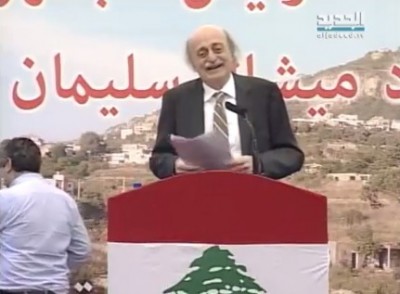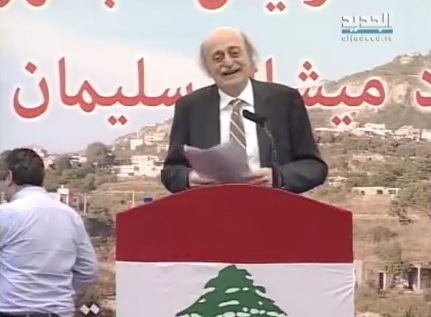 Beirut, Lebanon- Progressive Socialist Party leader MP Walid Jumblatt said that he is willing to consider amendments to the Taif agreement in order to preserve the Christian presence by increasing the powers of the president.
Beirut, Lebanon- Progressive Socialist Party leader MP Walid Jumblatt said that he is willing to consider amendments to the Taif agreement in order to preserve the Christian presence by increasing the powers of the president.
“This is a necessity and a need in order to preserve the Christian [presence] in Lebanon and reinforce the president’s [powers] so that he can be a mediator in every sense of the word,” Jumblatt told As-Safir newspaper in remarks published on Friday
His comments come after Lebanese politicians haven’t been able to agree on a successor to Michel Suleiman, whose term ended last Sunday.
The absence of a president is a setback for all the Lebanese but specially to Lebanon’s Christian community, whose influence has diminished since the country’s 1975-90 war.
In Lebanon’s power-sharing system, the president must be Maronite Christian , the prime minister a Sunni Muslim and the parliament speaker a Shiite Muslim.
Jumblatt who wields a critical swing vote in the parliament did not spell out the amendments he has in mind but in his farewell speech Suleiman, who like Jumblatt is a centrist called for constitutional reforms that would expand the authority of the president.
“The constitutional practices in the past six years revealed constitutional gaps that obstruct political work in the country,” Suleiman said. “The constitutional committee prepared a suggestion to amend the constitution that would be handed in to the next president.”
The constitutional amendments Suleiman suggested included “restoring the right for the executive power to dismantle the Parliament under the initiative of the president and giving the president the right to call for an exceptional Cabinet session when needed.”
Other reforms included giving a specific constitutional deadline to Cabinet to sign decrees and laws as is the case for the president. Suleiman also said that Parliament should place urgent draft laws rejected by the president and sent back to Parliament on the latter’s first session to be held thereafter.
The Taif Agreement (also “National Reconciliation Accord,” or “Document of National Accord”) was an agreement reached to provide “the basis for the ending of the civil war and the return to political normalcy in Lebanon.” Negotiated in Taif, Saudi Arabia, it was designed to end the decades-long Lebanese civil war, politically accommodate the demographic shift to a Muslim majority. It was signed on 22 October 1989 and ratified by the Lebanese parliament on 5 November 1989.
The Taif accord restructured the National Pact political system in Lebanon by transferring some of the power away from the Maronite Christian community to the Muslim communities namely the Shiites and Sunnis. Prior to Taif, the Sunni Muslim Prime Minister was appointed by and responsible to the Maronite President. After Taif the Prime Minister was responsible to the legislature, as in a traditional parliamentary system. Therefore, the agreement changed the power-sharing formula that had favoured the Christians to a 50:50 ratio and enhanced the powers of the Sunni prime minister over those of the Christian president.
Jumblatt also said that he preferred holding the presidential elections before the parliamentary elections.
He also said he is holding onto his presidential candidate Henri Helou and added that if the international community did not intervene in the presidential elections, there might be no solution to overcome the current deadlock.


Leave a Reply
You must be logged in to post a comment.